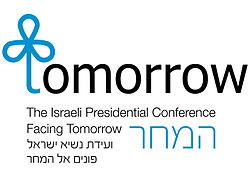Israeli Presidential Conference
| Israeli Presidential Conference | |
|---|---|
 | |
| Genre | conference |
| Frequency | annually |
| Location(s) | Jerusalem |
| Country | Israel |
| Years active | 2008–present |
| Founder | Shimon Peres |
The Israeli Presidential Conference is a high level conference held in Jerusalem, once every 18 months originally, and more recently annually, under the auspices of the Israeli President and Nobel Prize laureate, Shimon Peres. The gathering, titled "Facing Tomorrow", brings together the world top leaders and thinkers in a wide variety of fields including policy, energy, science, economics, culture, art, religion, and thought, to navigate the most pressing global challenges ahead.
History
[edit]The Conference was inaugurated in May 2008 by Israel's ninth President, Shimon Peres. The conference seeks to investigate the crises and solutions, trends and innovations, visions and ideals that are shaping our collective future. The aim of the Conference was the development of an annual event that not only "talks" but also drives action and encourages practical initiatives.
Previous conferences had as speakers a variety of global leaders, international scholars and activists, poets and scientists, artists and clergy, entrepreneurs, economists and industrialists, including George W. Bush, Elie Wiesel, Robert De Niro, Rupert Murdoch, and Bernard-Henri Lévy.[1]
| Dates | Location | Theme | URL |
|---|---|---|---|
| 18 – 20 June 2013 | Jerusalem | The Human Factor | 2013 |
| 19 – 21 June 2012 | Jerusalem | 2012 | |
| 21 – 23 June 2011 | Jerusalem | A thriving tomorrow or a declining tomorrow? | 2011 |
| 20 – 22 October 2009 | Jerusalem | Our Mutual Tomorrow | 2009 |
| 13 – 15 May 2008 | Jerusalem | 2008 |
Structure
[edit]Each Conference consists of plenary sessions, panel discussions, roundtables, master classes and an exhibition.
The 2008 Conference Steering Committee partnered with The Jewish Policy Planning Institute to develop and produce the Conference.[2] The 2009, 2011, 2012 and 2013 Steering Committees partnered with The Hebrew University of Jerusalem to develop and produce the Conference.[3][4]
2013 Boycott Campaign
[edit]On 7 May 2013, physicist Stephen Hawking informed the organizers that he was cancelling his participation as keynote speaker. He indicated that this was in support of the academic boycott protesting Israel's treatment of Palestinians.[5] It was later found that among the 20 academics who lobbied Hawking to boycott were Noam Chomsky and Malcolm Levitt who advocated boycott as the proper method for scientist to respond to the "explicit policy" of "systemic discrimination" against the non-Jewish and Palestinian population. Hawkings decision was heavily criticized by several academics, including former Harvard University president Larry Summers and David Newman, who warned that "an academic boycott just destroys one of the very few spaces left where Israelis and Palestinians actually do come together."[6][7][8]
See also
[edit]References
[edit]- ^ "Israeli Presidential Conference Website". About the Conference. Retrieved 6 May 2011.
- ^ "Israeli Presidential Conference Facing Tomorrow". Conference Organizers. Retrieved 6 May 2011.
- ^ "The Israeli Presidential Conference". Conference Organizers.
- ^ "2011 Israeli Presidential Conference". Conference Organizers. Retrieved 6 May 2011.
- ^ Stephen Hawking joins academic boycott of Israel The Guardian, 2012-05-08.
- ^ Robert Booth and Harriet Sherwood (10 May 2013). "Noam Chomsky helped lobby Stephen Hawking to stage Israel boycott". The Guardian. Retrieved 11 May 2013.
- ^ Summers at IPC
- ^ Muslim writer touts Israeli tolerance of minorities
